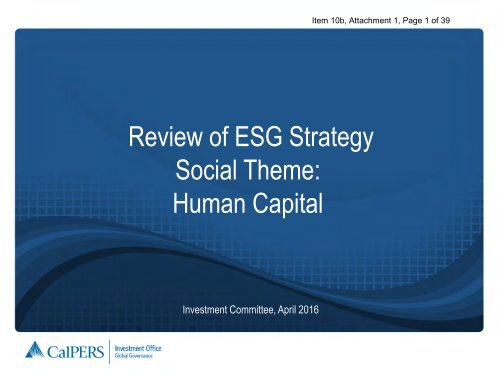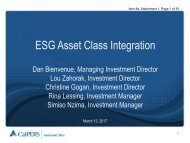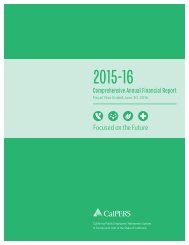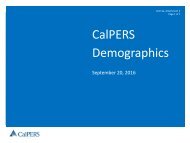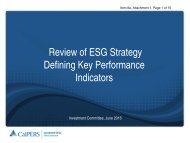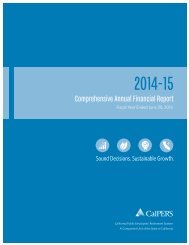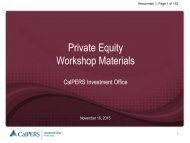Review of ESG Strategy Social Theme Human Capital
10FKDN
10FKDN
You also want an ePaper? Increase the reach of your titles
YUMPU automatically turns print PDFs into web optimized ePapers that Google loves.
Item 10b, Attachment 1, Page 1 <strong>of</strong> 39<br />
<strong>Review</strong> <strong>of</strong> <strong>ESG</strong> <strong>Strategy</strong><br />
<strong>Social</strong> <strong>Theme</strong>:<br />
<strong>Human</strong> <strong>Capital</strong><br />
Investment Committee, April 2016
<strong>Review</strong> <strong>of</strong> <strong>ESG</strong> <strong>Strategy</strong> - <strong>Social</strong> <strong>Theme</strong>: <strong>Human</strong> <strong>Capital</strong><br />
Item 10b, Attachment 1, Page 2 <strong>of</strong> 39<br />
Objectives<br />
• Seek Investment Committee feedback on Environmental, <strong>Social</strong> and<br />
Governance (<strong>ESG</strong>) Strategic Priorities with particular focus on the “S”<br />
• Conduct an in-depth review <strong>of</strong> our proposed focus on human capital<br />
• Initiate discussion <strong>of</strong> potential key performance indicators (KPIs)<br />
2
<strong>Review</strong> <strong>of</strong> <strong>ESG</strong> <strong>Strategy</strong> - <strong>Social</strong> <strong>Theme</strong>: <strong>Human</strong> <strong>Capital</strong><br />
Item 10b, Attachment 1, Page 3 <strong>of</strong> 39<br />
Recommended Strategic Priorities: <strong>ESG</strong><br />
Climate Change <strong>Human</strong> <strong>Capital</strong> Alignment <strong>of</strong> Interest<br />
• Data and corporate reporting<br />
standards<br />
(includes water risk)<br />
E S G<br />
• Data and corporate reporting<br />
standards<br />
(includes human capital)<br />
• Data and corporate reporting<br />
standards<br />
(focusing on the long-term)<br />
• Manager Expectations Pilot<br />
(includes water risk)<br />
• Research<br />
• Sustainable Investment<br />
Research Initiative (SIRI)<br />
• Global Equity Strategies<br />
• Engage 80 PRI Montreal Pledge<br />
Companies<br />
(identify water risk candidates)<br />
• Carbon Footprinting – Total fund<br />
• Thermal Coal Companies –<br />
(SB185)<br />
• Manager Expectations<br />
• Research<br />
• SIRI<br />
• Diversity<br />
• Income inequality<br />
• Diversity and Inclusion<br />
• Responsible Contractor Program<br />
• Supply Chain Activities<br />
• Income Inequality (placeholder)<br />
• Manager Expectations<br />
• Research<br />
• SIRI<br />
• Principles and Proxy Voting<br />
(including proxy access and majority<br />
voting)<br />
• Focus List<br />
• Fee and performance transparency<br />
• Divestment<br />
Work through Partnerships to leverage resources and impact<br />
3
<strong>Review</strong> <strong>of</strong> <strong>ESG</strong> <strong>Strategy</strong> - <strong>Social</strong> <strong>Theme</strong>: <strong>Human</strong> <strong>Capital</strong><br />
Item 10b, Attachment 1, Page 4 <strong>of</strong> 39<br />
2015 Timeline: Global Governance Principles <strong>Review</strong><br />
4
<strong>Review</strong> <strong>of</strong> <strong>ESG</strong> <strong>Strategy</strong> - <strong>Social</strong> <strong>Theme</strong>: <strong>Human</strong> <strong>Capital</strong><br />
Item 10b, Attachment 1, Page 5 <strong>of</strong> 39<br />
2016 Timeline for Developing a 3-5 Year Strategic Plan<br />
5
<strong>Review</strong> <strong>of</strong> <strong>ESG</strong> <strong>Strategy</strong> - <strong>Social</strong> <strong>Theme</strong>: <strong>Human</strong> <strong>Capital</strong><br />
Item 10b, Attachment 1, Page 6 <strong>of</strong> 39<br />
Investment Beliefs<br />
CalPERS’ Investment Beliefs frame our fiduciary approach to human capital.<br />
Investment Belief 3<br />
CalPERS investment decisions may reflect wider stakeholder views, provided they are<br />
consistent with its fiduciary duty to members and beneficiaries.<br />
• In considering whether to engage on issues raised by stakeholders, CalPERS will use the<br />
following prioritization framework:<br />
– Principles and Policy – to what extent is the issue supported by CalPERS Investment<br />
Beliefs, Principles <strong>of</strong> Accountable Corporate Governance or other Investment Policy?<br />
– Materiality – does the issue have the potential for an impact on portfolio risk or return?<br />
– Definition and Likelihood <strong>of</strong> Success – is success likely, in that CalPERS action will<br />
influence an outcome which can be measured? Can we partner with others to achieve<br />
success or would someone else be more suited to carry the issue?<br />
– Capacity – does CalPERS have the expertise, resources and standing to influence an<br />
outcome?<br />
6
<strong>Review</strong> <strong>of</strong> <strong>ESG</strong> <strong>Strategy</strong> - <strong>Social</strong> <strong>Theme</strong>: <strong>Human</strong> <strong>Capital</strong><br />
Item 10b, Attachment 1, Page 7 <strong>of</strong> 39<br />
Investment Beliefs<br />
Investment Belief 4<br />
Long-term value creation requires effective management <strong>of</strong> three forms <strong>of</strong> capital: financial,<br />
physical, and human.<br />
• Strong governance, along with effective management <strong>of</strong> environmental and human capital<br />
factors, increases the likelihood that companies will perform over the long-term and<br />
manage risk effectively.<br />
• CalPERS may engage investee companies and external managers on their governance<br />
and sustainability issues, including:<br />
– Governance practices, including but not limited to alignment <strong>of</strong> interests<br />
– Risk Management practices<br />
– <strong>Human</strong> <strong>Capital</strong> practices, including but not limited to fair labor practices, health and<br />
safety, responsible contracting and diversity<br />
– Environmental practices, including but not limited to climate change and natural<br />
resource availability<br />
7
<strong>Review</strong> <strong>of</strong> <strong>ESG</strong> <strong>Strategy</strong> - <strong>Social</strong> <strong>Theme</strong>: <strong>Human</strong> <strong>Capital</strong><br />
Item 10b, Attachment 1, Page 8 <strong>of</strong> 39<br />
Investment Beliefs<br />
Investment Belief 7<br />
CalPERS will take risk only where we have a strong belief we will be rewarded for it.<br />
• An expectation <strong>of</strong> a return premium is required to take risks; CalPERS aims to maximize<br />
return for the risk taken.<br />
• Markets are not perfectly efficient, but inefficiencies are difficult to exploit after costs.<br />
Investment Belief 8<br />
Costs matter and need to be effectively managed.<br />
• CalPERS will balance risk, return and cost when choosing and evaluating investment<br />
managers and investment strategies.<br />
8
<strong>Review</strong> <strong>of</strong> <strong>ESG</strong> <strong>Strategy</strong> - <strong>Social</strong> <strong>Theme</strong>: <strong>Human</strong> <strong>Capital</strong><br />
Item 10b, Attachment 1, Page 9 <strong>of</strong> 39<br />
Investment Beliefs<br />
Investment Belief 9<br />
Risk to CalPERS is multi-faceted and not fully captured through measures such as volatility or<br />
tracking error.<br />
• CalPERS shall develop a broad set <strong>of</strong> investment and actuarial risk measures and clear<br />
processes for managing risk.<br />
• As a long-term investor, CalPERS must consider risk factors, for example climate change<br />
and natural resource availability that emerge slowly over long time periods, but could have<br />
a material impact on company or portfolio returns.<br />
Investment Belief 10<br />
Strong processes and teamwork and deep resources are needed to achieve CalPERS goals<br />
and objectives.<br />
• Diversity <strong>of</strong> talent (including a broad range <strong>of</strong> education, experience, perspectives and<br />
skills) at all levels (Board, staff, external managers, corporate boards) is important.<br />
9
<strong>Review</strong> <strong>of</strong> <strong>ESG</strong> <strong>Strategy</strong> - <strong>Social</strong> <strong>Theme</strong>: <strong>Human</strong> <strong>Capital</strong><br />
Item 10b, Attachment 1, Page 10 <strong>of</strong> 39<br />
Current <strong>Strategy</strong> on <strong>ESG</strong><br />
• Environmental<br />
Climate Risk<br />
• <strong>Social</strong><br />
<strong>Human</strong> <strong>Capital</strong><br />
• Governance<br />
Alignment <strong>of</strong> Interest<br />
Our approach<br />
utilizes three<br />
channels supported<br />
by partnerships<br />
Engagement<br />
Integration<br />
Advocacy<br />
Partnerships<br />
10
<strong>Review</strong> <strong>of</strong> <strong>ESG</strong> <strong>Strategy</strong> - <strong>Social</strong> <strong>Theme</strong>: <strong>Human</strong> <strong>Capital</strong><br />
Item 10b, Attachment 1, Page 11 <strong>of</strong> 39<br />
<strong>Human</strong> <strong>Capital</strong> | Risks and Opportunities<br />
“Demographically diverse groups are exposed to a wider range <strong>of</strong> perspectives than homogenous groups,<br />
but diversity can also lead people to process evidence more accurately, and to discuss controversial and<br />
polarizing issues.”<br />
Tufts University, Research & Publications, Race & Interpersonal Processes<br />
“A ‘high degree <strong>of</strong> groupthink’ was identified as<br />
contributing to the International Monetary Fund’s<br />
failure to correctly identify the risks leading up to<br />
the worldwide financial crisis.”<br />
Independent Evaluation Office <strong>of</strong> the<br />
International Monetary Fund, Why did the IMF<br />
Fail to Give Clear Warning? (April 12 , 2011)<br />
“Companies in the top<br />
quartile for racial and<br />
ethnic diversity are 35<br />
percent more likely to have<br />
returns above their<br />
respective national industry<br />
medians.”<br />
McKinsey & Company, Why Diversity<br />
Matters, (February 2, 2015)<br />
“Beyond gender, other<br />
dimensions <strong>of</strong> diversity<br />
are also found to be good<br />
for business: race, board<br />
member background,<br />
LGBT identity, nationality.”<br />
Catalyst, Why Diversity<br />
Matters, (July 2013)<br />
11
<strong>Review</strong> <strong>of</strong> <strong>ESG</strong> <strong>Strategy</strong> - <strong>Social</strong> <strong>Theme</strong>: <strong>Human</strong> <strong>Capital</strong><br />
Board Diversity | S&P 500 Companies<br />
Item 10b, Attachment 1, Page 12 <strong>of</strong> 39<br />
Despite increased attention to board diversity, progress has been slow.<br />
1.3%<br />
4.2%<br />
2010<br />
9.6%<br />
Asian<br />
Hispanic/Latino<br />
2015<br />
1.8% 4.8%<br />
8.6%<br />
Asian<br />
Hispanic/Latino<br />
83.7%<br />
African-American<br />
Other<br />
83.6%<br />
African-American<br />
Other<br />
Sources: 2015 Spencer Stuart Board Index<br />
12
<strong>Review</strong> <strong>of</strong> <strong>ESG</strong> <strong>Strategy</strong> - <strong>Social</strong> <strong>Theme</strong>: <strong>Human</strong> <strong>Capital</strong><br />
Board Diversity | S&P 500 Companies<br />
Item 10b, Attachment 1, Page 13 <strong>of</strong> 39<br />
2010<br />
Men<br />
Women<br />
2015<br />
16%<br />
20%<br />
84%<br />
80%<br />
Sources: 2015 Spencer Stuart Board Index<br />
13
<strong>Review</strong> <strong>of</strong> <strong>ESG</strong> <strong>Strategy</strong> - <strong>Social</strong> <strong>Theme</strong>: <strong>Human</strong> <strong>Capital</strong><br />
Item 10b, Attachment 1, Page 14 <strong>of</strong> 39<br />
<strong>Human</strong> <strong>Capital</strong> Focus | Overview<br />
To fulfill CalPERS’ fiduciary duty by:<br />
• Understanding and managing investment risks and value drivers related to human capital<br />
that contribute to long-term sustainable returns.<br />
Advocacy Engagement Integration<br />
• Data and Corporate Reporting<br />
standards (includes <strong>Human</strong> <strong>Capital</strong><br />
metrics)<br />
• SEC<br />
• Board Diversity Petition<br />
• Disclosure Effectiveness<br />
Initiative<br />
• Diversity and Inclusion<br />
• Board Diversity<br />
• Engage selected companies<br />
• Diverse Director DataSource<br />
(3D)<br />
• Supply Chain Activities<br />
• <strong>Human</strong> <strong>Capital</strong> Management<br />
Coalition<br />
• Income inequality (placeholder)<br />
• Principles and Proxy Voting<br />
• Proxy Access Focus on Diversity<br />
• Responsible Contractor Policy<br />
• INVO’s Diversity and Inclusion<br />
Steering Committee<br />
• Emerging Manager five-year<br />
plan<br />
• INVO Talent Management<br />
Initiative<br />
• Board Diversity<br />
• Manager Expectations Pilot<br />
• Sustainable Investment Research<br />
Initiative (SIRI) refresh (Diversity<br />
and inequality are new areas focus)<br />
14
<strong>Review</strong> <strong>of</strong> <strong>ESG</strong> <strong>Strategy</strong> - <strong>Social</strong> <strong>Theme</strong>: <strong>Human</strong> <strong>Capital</strong><br />
Item 10b, Attachment 1, Page 15 <strong>of</strong> 39<br />
Advocacy | Board Diversity<br />
Objective<br />
• Advocate for rulemaking, data and corporate reporting standards to improve disclosure on board diversity<br />
and inclusion.<br />
Initiative<br />
• Promote the SEC Diversity Petition – disclosure standards around the board diversity matrix.<br />
• Data and corporate reporting and disclosure – to include board diversity and inclusion.<br />
Ensure boards have strategies to address:<br />
- Board diversity<br />
- Board tenure<br />
- Policies and practices<br />
- Matrix disclosures around board skills sets and company strategy<br />
Potential Key Performance Indicator<br />
• The SEC includes Board Diversity disclosure in its work plan.<br />
• Accounting standard setters include Board Diversity disclosure standards in work plans.<br />
15
<strong>Review</strong> <strong>of</strong> <strong>ESG</strong> <strong>Strategy</strong> - <strong>Social</strong> <strong>Theme</strong>: <strong>Human</strong> <strong>Capital</strong><br />
Item 10b, Attachment 1, Page 16 <strong>of</strong> 39<br />
Proposed Timeline | Advocacy<br />
Year 1<br />
Year 2<br />
Year 3<br />
Years 4-5<br />
• Include Board Diversity petition initiative in<br />
advocacy activities working with peer funds<br />
• Continue active responses within the SEC<br />
Disclosure Effectiveness initiative focused on<br />
diversity related data and corporate reporting<br />
• Support Sustainability Accounting<br />
Standards Board (SASB) in the<br />
development <strong>of</strong> integrated reporting<br />
initiatives including the American<br />
Institute <strong>of</strong> CPAs (AICPA) that support<br />
enhanced transparency on board<br />
diversity information<br />
• Continue work on SEC Disclosure<br />
Effectiveness focused on diversity<br />
issues and other issues that support<br />
healthy board turnover<br />
• Continue advocacy for enhanced<br />
data and corporate reporting and<br />
disclosures around board diversity<br />
information in line with diversity<br />
petition matrix information<br />
• Continue work on SEC Disclosure<br />
Effectiveness focused on diversity<br />
issues and other issues that support<br />
healthy board turnover<br />
• Advocate for listing standards on<br />
board tenure and diversity disclosure<br />
that are in-line with Principles<br />
• <strong>Review</strong> status <strong>of</strong> board diversity<br />
advocacy and SEC Disclosure<br />
Effectiveness work and develop<br />
plans for next advocacy phase<br />
• Execute on plans developed in<br />
year 4<br />
16
<strong>Review</strong> <strong>of</strong> <strong>ESG</strong> <strong>Strategy</strong> - <strong>Social</strong> <strong>Theme</strong>: <strong>Human</strong> <strong>Capital</strong><br />
Item 10b, Attachment 1, Page 17 <strong>of</strong> 39<br />
Engagement | Board Diversity<br />
Objective<br />
• Fulfill our fiduciary responsibilities with a targeted focus on companies that continue to lack board<br />
diversity in order to improve board quality.<br />
Initiative<br />
• Develop an engagement list <strong>of</strong> companies lacking board diversity.<br />
• Use engagement and shareowner campaigns (proxy access) success to push for diverse boards.<br />
Ensure the companies have strategies in place to improve board quality including:<br />
- Board diversity<br />
- Board tenure<br />
- Rigorous board evaluations<br />
- Independence<br />
Potential Key Performance Indicator<br />
• Disclosure <strong>of</strong> company board diversity strategies.<br />
- Competence<br />
- Matrix disclosures around board skill sets<br />
- Charters (nominating committee)<br />
17
<strong>Review</strong> <strong>of</strong> <strong>ESG</strong> <strong>Strategy</strong> - <strong>Social</strong> <strong>Theme</strong>: <strong>Human</strong> <strong>Capital</strong><br />
Item 10b, Attachment 1, Page 18 <strong>of</strong> 39<br />
Engagement | Supply Chain Activities<br />
Objective<br />
• Focus on managing human capital risk and opportunity through engaging companies regarding supply<br />
chain.<br />
Initiative<br />
• Partner with the <strong>Human</strong> <strong>Capital</strong> Management Coalition to develop a focused engagement list.<br />
Engage companies to ensure that those companies have strategies in place to address:<br />
– Universal <strong>Human</strong> Rights<br />
– Diversity & Equal Employment Opportunity<br />
– Freedom <strong>of</strong> Association<br />
– Fair Competition<br />
– Safe and Healthy Workplace<br />
– Eliminating all forms <strong>of</strong> forced and compulsory labor<br />
– Elimination <strong>of</strong> harmful labor practices or use <strong>of</strong> child<br />
labor<br />
Potential Key Performance Indicators<br />
• Companies disclose policies on how they monitor, measure and manage supply chain risk.<br />
Source: p. 24, CalPERS Global Governance Principles,<br />
18
<strong>Review</strong> <strong>of</strong> <strong>ESG</strong> <strong>Strategy</strong> - <strong>Social</strong> <strong>Theme</strong>: <strong>Human</strong> <strong>Capital</strong><br />
Item 10b, Attachment 1, Page 19 <strong>of</strong> 39<br />
Engagement | Established Managers<br />
Objective<br />
• Develop and implement an Established Manager D&I Engagement <strong>Strategy</strong>.<br />
Initiative<br />
• Establish strategic manager D&I outreach, engagement and reporting initiative.<br />
- Survey managers for diverse staff in key associate, management, and leadership roles<br />
- Engage managers on diversity and inclusion policies, initiatives and outcomes<br />
- Consider establishing a partnership initiative with an established manager(s) to increase the diversity<br />
<strong>of</strong> pipeline <strong>of</strong> talent entering financial services<br />
Potential Key Performance Indicators<br />
• Manager survey report.<br />
• Engagement with established managers.<br />
19
<strong>Review</strong> <strong>of</strong> <strong>ESG</strong> <strong>Strategy</strong> - <strong>Social</strong> <strong>Theme</strong>: <strong>Human</strong> <strong>Capital</strong><br />
Item 10b, Attachment 1, Page 20 <strong>of</strong> 39<br />
Proposed Timeline | Engagement<br />
Year 1<br />
Year 2<br />
Year 3<br />
Years 4-5<br />
• Generate an engagement focus list <strong>of</strong><br />
companies to address diversity<br />
• Use proxy access in partnership with<br />
others to enhance board quality<br />
• Facilitate enhancement <strong>of</strong> Diverse<br />
Director DataSource (3D)<br />
• SIRI research complete<br />
• Assessment <strong>of</strong> whether an action plan<br />
is warranted<br />
• Use proxy access in partnership with<br />
others to promote diverse boards<br />
• Support Diverse Director DataSource<br />
(3D)<br />
• Work with the <strong>Human</strong> <strong>Capital</strong><br />
Management (HCM) Coalition to<br />
identify companies for engagement<br />
• Develop an action plan supported by<br />
the research and consistent with<br />
Investment Beliefs<br />
• Engage companies with zero<br />
diversity where change would<br />
have the most impact on<br />
CalPERS<br />
• Develop additional supply<br />
chain related relationships to<br />
further conduct due diligence<br />
on supply chain activities<br />
• Broaden board diversity work<br />
by industry<br />
• Use proxy access in<br />
partnership with others to<br />
enhance board diversity<br />
• Complete engagement <strong>of</strong> zero<br />
diversity companies and review<br />
20
<strong>Review</strong> <strong>of</strong> <strong>ESG</strong> <strong>Strategy</strong> - <strong>Social</strong> <strong>Theme</strong>: <strong>Human</strong> <strong>Capital</strong><br />
Integration | Manager Expectations<br />
Each asset class has draft Sustainable Investment Practice Guidelines (Guidelines) describing how staff and<br />
external managers are expected to approach <strong>ESG</strong> considerations in investment processes.<br />
Objective<br />
• Integrate material human capital factors into assessing risk and opportunity in investment decision-making<br />
across the Total Fund.<br />
Initiative<br />
• Continue improving the Guidelines for how each asset class expects staff to incorporate sustainability risk<br />
and opportunity considerations into manager selection (and asset selection where relevant), contracting,<br />
monitoring and managing.<br />
• <strong>Human</strong> capital factors include human rights, diversity, health & safety. (Source: Principles for Responsible Investment)<br />
Potential Key Performance Indicator<br />
Item 10b, Attachment 1, Page 21 <strong>of</strong> 39<br />
• Develop metrics to track implementation <strong>of</strong> the Guidelines in contracting, monitoring and managing. (For<br />
example, percentage <strong>of</strong> new contracts with <strong>ESG</strong> requirements or % and frequency <strong>of</strong> existing portfolio<br />
assessment for human capital risks)<br />
• Relevant factors identified and integrated across the portfolio.<br />
21
<strong>Review</strong> <strong>of</strong> <strong>ESG</strong> <strong>Strategy</strong> - <strong>Social</strong> <strong>Theme</strong>: <strong>Human</strong> <strong>Capital</strong><br />
Item 10b, Attachment 1, Page 22 <strong>of</strong> 39<br />
Integration | Responsible Contractor Program<br />
Objective<br />
• Continue administration <strong>of</strong> the Responsible Contractor Program (RCP) Policy and Neutrality Trial<br />
Program in the Real Assets portfolio.<br />
Initiative<br />
• Continue to engage with stakeholders, address labor issues, and report to the Investment Committee<br />
on activities under the Policy.<br />
- Prepare RCP report under the revised Policy to be presented to the Investment Committee in<br />
December.<br />
- Engage with labor representatives and Real Assets managers on revised Policy and any related<br />
issues.<br />
Potential Key Performance Indicators<br />
• Present annual reports to the Investment Committee.<br />
• Resolution <strong>of</strong> formal complaints.<br />
22
<strong>Review</strong> <strong>of</strong> <strong>ESG</strong> <strong>Strategy</strong> - <strong>Social</strong> <strong>Theme</strong>: <strong>Human</strong> <strong>Capital</strong><br />
Objective<br />
• Establish and implement Talent Management initiatives under the INVO D&I 2020 Plan<br />
Initiative<br />
• Implement and conduct regular reviews <strong>of</strong> Strategic Partner Plan.<br />
• Draft and implement INVO D&I Education and Training Plan.<br />
Item 10b, Attachment 1, Page 23 <strong>of</strong> 39<br />
Integration | Diversity & Inclusion Talent Management<br />
• Establish a communication strategy to improve staff awareness and understanding <strong>of</strong> Talent<br />
Management initiatives under the INVO D&I 2020 Plan.<br />
- Increase the pool <strong>of</strong> qualified diverse<br />
applicants for open positions in INVO<br />
- Identify training opportunities<br />
- Network with diverse organizations<br />
- Provide regular staff D&I updates via<br />
email and at INVO All-Staff Meetings<br />
Potential Key Performance Indicators<br />
• Increase diversity in pools <strong>of</strong> candidates as a result <strong>of</strong> Strategic Partnerships.<br />
• Finalize and implement Talent Management plans, which will include additional KPIs.<br />
23
<strong>Review</strong> <strong>of</strong> <strong>ESG</strong> <strong>Strategy</strong> - <strong>Social</strong> <strong>Theme</strong>: <strong>Human</strong> <strong>Capital</strong><br />
Item 10b, Attachment 1, Page 24 <strong>of</strong> 39<br />
Integration| Emerging Manager Five-Year Plan<br />
Objective<br />
• Continue initiatives under the Emerging Manager Five-Year Plan — Pathway to the Future which provides a<br />
strategic framework to guide CalPERS’ investments and engagement with emerging investment managers.<br />
Initiative<br />
• Finalize appropriate initiatives, continue on-going efforts, and establish new work to be undertaken under the<br />
Plan.<br />
‐ Report performance <strong>of</strong> updated and revised<br />
emerging manager programs<br />
‐ Track and report exposure to, and diversity <strong>of</strong>,<br />
CalPERS Emerging and Transition Managers<br />
Potential Key Performance Indicators<br />
- Strengthen and maintain CalPERS presence in<br />
emerging and diverse manager networks<br />
- Initiate legislative efforts to extend the Plan<br />
• Report to Investment Committee and transmit annual updates as required to the Legislature.<br />
• Establish framework for process and deployment <strong>of</strong> new capital to emerging and transition managers.<br />
• Report to Investment Committee year over year exposure to emerging and transition managers.<br />
• Evaluate and seek legislative approval for extension <strong>of</strong> the Plan.<br />
24
<strong>Review</strong> <strong>of</strong> <strong>ESG</strong> <strong>Strategy</strong> - <strong>Social</strong> <strong>Theme</strong>: <strong>Human</strong> <strong>Capital</strong><br />
Item 10b, Attachment 1, Page 25 <strong>of</strong> 39<br />
Proposed Timeline | Integration<br />
Year 1<br />
Year 2<br />
Year 3<br />
Year 4 - 5<br />
• Develop INVO D&I 2020 Plan;<br />
• Complete first Annual Report under the<br />
revised 2015 RCP Policy;<br />
• Pilot Manager Expectations.<br />
• Begin implementation <strong>of</strong> INVO D&I<br />
2020 Plan;<br />
• Develop INVO D&I Talent<br />
Management Plan;<br />
• Draft and implement D&I Staff<br />
Education and Training Plan;<br />
• Establish a Communication <strong>Strategy</strong> to<br />
Improve Staff Knowledge <strong>of</strong> D&I<br />
Initiatives;<br />
• Engage Managers on Diversity<br />
and Inclusion Policies,<br />
Initiatives and Outcomes;<br />
• Implement Staff Education and<br />
Training Plan;<br />
• Survey managers on diversity<br />
<strong>of</strong> key positions and Diversity<br />
and Inclusion practices.<br />
• Host a CalPERS Diversity<br />
Forum / Event;<br />
• Survey Managers for diverse<br />
ownership;<br />
• Establish partnership initiative<br />
to increase diversity <strong>of</strong> pipeline<br />
<strong>of</strong> talent entering financial<br />
services.<br />
• Assess Strategic Partner Plan;<br />
• Host a CalPERS Diversity Forum.<br />
25
<strong>Review</strong> <strong>of</strong> <strong>ESG</strong> <strong>Strategy</strong> - <strong>Social</strong> <strong>Theme</strong>: <strong>Human</strong> <strong>Capital</strong><br />
Item 10b, Attachment 1, Page 26 <strong>of</strong> 39<br />
Appendix:<br />
1. CalPERS Global Governance Principles: Diversity<br />
2. Examples <strong>of</strong> <strong>ESG</strong> Factors – <strong>Human</strong> <strong>Capital</strong><br />
3. <strong>Human</strong> <strong>Capital</strong>: Examples from Peer Funds<br />
4. Current work: <strong>Human</strong> <strong>Capital</strong> Initiatives<br />
5. HCM Coalition Engagement Framework<br />
6. Integration Focus: Manager Expectations<br />
7. Sustainable Accounting Standards Board – <strong>Human</strong> <strong>Capital</strong> Topics and Metrics<br />
26
<strong>Review</strong> <strong>of</strong> <strong>ESG</strong> <strong>Strategy</strong> - <strong>Social</strong> <strong>Theme</strong>: <strong>Human</strong> <strong>Capital</strong><br />
Board Quality | Diversity, Independence and Competence<br />
CalPERS Global Governance Principles, March 2016<br />
Item 10b, Attachment 1, Page 27 <strong>of</strong> 39<br />
B. Board Quality: Diversity, Independence and Competence<br />
9. Board Talent Assessment and Diversity:<br />
The board should facilitate a process that ensures a thorough<br />
understanding <strong>of</strong> the diverse characteristics necessary to effectively<br />
oversee management's execution <strong>of</strong> a long-term business strategy. Board<br />
diversity should be thought <strong>of</strong> in terms <strong>of</strong> skill sets, gender, age, nationality,<br />
race, sexual orientation, gender identity, and historically under-represented<br />
groups. Consideration should go beyond the traditional notion <strong>of</strong> diversity to<br />
include a more broad range <strong>of</strong> experience, thoughts, perspectives, and<br />
competencies to help enable effective board leadership.<br />
27
<strong>Review</strong> <strong>of</strong> <strong>ESG</strong> <strong>Strategy</strong> - <strong>Social</strong> <strong>Theme</strong>: <strong>Human</strong> <strong>Capital</strong><br />
Item 10b, Attachment 1, Page 28 <strong>of</strong> 39<br />
1. PRI Examples <strong>of</strong> <strong>ESG</strong> factors | <strong>Human</strong> <strong>Capital</strong><br />
Environmental <strong>Social</strong> Governance<br />
Biodiversity Customer satisfaction Accounting standards<br />
Climate change Data protection and privacy Anti-competitive behavior<br />
Deforestation *Diversity and equal opportunities Audit committee structure<br />
Ecosystems services Employee attraction and retention Board composition<br />
Energy efficiency *Employee engagement Bribery and corruption<br />
Hazardous materials Government and community relations Business ethics<br />
Land degradation *<strong>Human</strong> capital management Compliance<br />
Resource depletion <strong>Human</strong> rights Executive remuneration<br />
Water management Indigenous rights Lobbying<br />
Water scarcity *Labor standards Political contributions<br />
Labor-management relations<br />
Risk management<br />
Marketing communications<br />
Separation <strong>of</strong> chairman and CEO<br />
Product mis-selling<br />
Stakeholder dialogue<br />
Product safety and liability<br />
Succession planning<br />
*Supply chain management<br />
Whistleblower schemes<br />
Workplace health and safety<br />
*Used in Manager Expectations<br />
Source: Responsible Investment in Private Equity – a Guide for Limited Partners<br />
(p. 24, 2 nd edition, June 2011), Principles for Responsible Investment<br />
28
<strong>Review</strong> <strong>of</strong> <strong>ESG</strong> <strong>Strategy</strong> - <strong>Social</strong> <strong>Theme</strong>: <strong>Human</strong> <strong>Capital</strong><br />
Item 10b, Attachment 1, Page 29 <strong>of</strong> 39<br />
2. <strong>Human</strong> <strong>Capital</strong> | Examples from Peer Funds<br />
Caisse des Depots Group<br />
• Housing<br />
CalSTRS<br />
• Board Diversity<br />
• Supply Chain<br />
Canada Pension Plan Investment Board<br />
(CPPIB)<br />
• Extractive Industries (human rights)<br />
Norges Bank Investment Management<br />
• Children's Rights<br />
SwedFund<br />
• World Poverty<br />
Office <strong>of</strong> the New York State Comptroller<br />
• Alignment <strong>of</strong> Interest<br />
• Board Diversity<br />
• Ban on Execution Drugs<br />
• Global Labor Standards<br />
• Sexual Orientation Non-Discrimination<br />
The Illinois General Board <strong>of</strong> Pension and Health<br />
Benefits (GBPHB)<br />
• Equal Employment Opportunity and Diversity<br />
• <strong>Human</strong> Rights<br />
• Code <strong>of</strong> Conduct for Suppliers & Global<br />
Facilities<br />
• Child Labor<br />
• Conflict Minerals<br />
• Poverty<br />
• Disaster Relief<br />
• Predatory Lending<br />
29
<strong>Review</strong> <strong>of</strong> <strong>ESG</strong> <strong>Strategy</strong> - <strong>Social</strong> <strong>Theme</strong>: <strong>Human</strong> <strong>Capital</strong><br />
3. Current Work│<strong>Human</strong> <strong>Capital</strong> Initiatives<br />
Engagement Work<br />
Completed Evolving Core<br />
Item 10b, Attachment 1, Page 30 <strong>of</strong> 39<br />
• Proxy Access Campaign<br />
Wins (12/20 Diversity<br />
related, 12 companies<br />
added a woman to board)<br />
• Aiming for A<br />
• Resolutions passed at 3<br />
companies<br />
• Carbon Asset <strong>Review</strong> – first<br />
phase<br />
• Joint letter with CalSTRS to<br />
160 California companies<br />
with no women on board,<br />
34 companies added a<br />
woman<br />
• Legislative Mandates<br />
• Global Governance continues<br />
engagement<br />
― Thermal Coal Companies (24)<br />
― Iran/Sudan (12), Northern<br />
Ireland and Holocaust (33)<br />
• Evolving to focus on 80 Montreal<br />
Pledge identified companies:<br />
• CERES Carbon Asset Risk (45)<br />
• Climate Risk Reporting (Aiming for<br />
A)<br />
• <strong>Human</strong> <strong>Capital</strong> Management<br />
Initiative- engagements with six<br />
companies on supply chain<br />
activities following tragedies in<br />
Bangladesh (including Carter’s,<br />
Children’s Place, Walmart, Kohl’s,<br />
Gap, and McDonald’s)<br />
• Shareholder Proposals ( <strong>Human</strong> <strong>Capital</strong> Proposals in 2015)<br />
― Proxy Solicitations<br />
― Exempt SEC Filings – Shareowner Letters<br />
• Proxy Access Campaign (Diversity continues as one <strong>of</strong> the<br />
priorities)<br />
• Advisory Vote on Executive Compensation<br />
― CalPERS letter writing campaign to communicate company<br />
“against” votes (488)<br />
• Board Quality and Diversity<br />
• Diverse Director Data Source (3D)<br />
• Enhanced Focus List – Japan (8)<br />
• Majority Voting for Director Elections Campaign (45)<br />
• Proxy Voting – Vote at 11,000 company meetings and 105,000<br />
resolutions annually<br />
• Proxy Voting Engagements<br />
― Over 1000 company engagements (via conference call, email,<br />
letter, and in-person meetings) on corporate governance related<br />
matters and proxy voting<br />
• The Conference Board – Boardroom Roundtable - Co-sponsored<br />
with CalPERS (Potential Board candidates meet with members <strong>of</strong><br />
corporate nominating committees at round-table)<br />
30
<strong>Review</strong> <strong>of</strong> <strong>ESG</strong> <strong>Strategy</strong> - <strong>Social</strong> <strong>Theme</strong>: <strong>Human</strong> <strong>Capital</strong><br />
Item 10b, Attachment 1, Page 31 <strong>of</strong> 39<br />
3. Current Work│<strong>Human</strong> <strong>Capital</strong> Initiatives<br />
Advocacy Work<br />
Completed Evolving Core<br />
• Climate Change Policy<br />
Advocacy<br />
― Global Investor Statement<br />
on Climate Change<br />
― “Pocantico Statement” on<br />
Climate Resilient<br />
Infrastructure<br />
― Paris Pledge for Action<br />
― Participation in United<br />
Nations climate events<br />
including: COP 21 (Paris),<br />
2014 & 2015 UN Climate<br />
Summits (New York)<br />
• Securities and Exchange<br />
Commission<br />
• Diversity Petition<br />
• Pay Ratio Rule<br />
• Work with Public Affairs and<br />
Legislative advisor to continue<br />
Climate Change Policy Advocacy<br />
― Environmental Protection<br />
Agency Clean Power Plan<br />
review<br />
― Carbon Pricing<br />
• United Nations Environmental<br />
Programme Finance Initiative<br />
― Inquiry into the Design <strong>of</strong> a<br />
Sustainable Financial System<br />
― Evolve work with United Nations<br />
to focus on 2018 meeting<br />
following up on Paris Agreement<br />
and engagement <strong>of</strong> Montreal<br />
Pledge companies<br />
• SEC Board Diversity disclosure<br />
rule<br />
• Legislative and Regulatory Guidelines<br />
― Investor Independence; Corporate Accountability; Financial<br />
Markets; Diversity; Sustainability<br />
• Commodities and Futures Trading Commission<br />
― Derivatives; CFTC Funding<br />
• Financial Accounting Standards Board<br />
― Materiality<br />
• International Accounting Standards Board<br />
― Conceptual Framework; Agenda<br />
• Securities and Exchange Commission<br />
― Proxy Access; Universal Proxy Ballots; Shareholder Proposal<br />
Rights; Executive Compensation; Derivatives; Political Spending;<br />
SEC Funding; Diversity disclosure rule; Climate Change<br />
• International Listing Standards (Hong Kong)<br />
• Litigation<br />
• Public Company Accounting Oversight Board<br />
― Auditing Standards; Audit Partner Disclosure<br />
• Targeted Investments Program – California Legislative Policy<br />
31
<strong>Review</strong> <strong>of</strong> <strong>ESG</strong> <strong>Strategy</strong> - <strong>Social</strong> <strong>Theme</strong>: <strong>Human</strong> <strong>Capital</strong><br />
Item 10b, Attachment 1, Page 32 <strong>of</strong> 39<br />
3. Current Work│<strong>Human</strong> <strong>Capital</strong> Initiatives<br />
Integration Work<br />
Completed Evolving Core<br />
• Global Equity Portfolio –<br />
HSBC<br />
• Private Equity – Clean<br />
Tech<br />
• Principles for Responsible<br />
Investment Reporting<br />
• Asset Owner Disclosure<br />
Project<br />
• Manager Expectations on <strong>ESG</strong><br />
• Montreal Pledge – carbon footprint<br />
• <strong>ESG</strong> Data and Tools<br />
• Global Governance Principles – Principle development: ―Investor Rights;<br />
Compensation; <strong>Capital</strong> Allocation: Environmental and Climate; Total Fund; <strong>Human</strong><br />
<strong>Capital</strong> Management; Alignment <strong>of</strong> Interest<br />
• Clean Power Research<br />
• Greenprint<br />
• GRESB Infrastructure – standards include human capital issues such as labor<br />
standards<br />
• Affordable Housing Policy<br />
• CA Investments<br />
• Responsible Contractor Policy<br />
• INVO Diversity and Inclusion Steering Committee<br />
― Corporate Board Diversity; Manager Expectations; INVO Talent Management<br />
• Targeted Investment Program (TIP) – Five Year Emerging, Transition, and<br />
Diverse Manager Programs; Responsible Contractor Policy<br />
32
<strong>Review</strong> <strong>of</strong> <strong>ESG</strong> <strong>Strategy</strong> - <strong>Social</strong> <strong>Theme</strong>: <strong>Human</strong> <strong>Capital</strong><br />
3. Current Work │ Diversity Engagements<br />
Item 10b, Attachment 1, Page 33 <strong>of</strong> 39<br />
CalPERS/CalSTRS 2014 joint letter to California companies with no women on the<br />
Board according to UC Davis study:<br />
Companies<br />
added a<br />
woman director<br />
34 34<br />
160<br />
Companies<br />
Companies<br />
no longer<br />
listed (M & A, etc.)<br />
CalPERS<br />
continuing<br />
engagement<br />
92<br />
Data as <strong>of</strong> January 2016<br />
33
<strong>Review</strong> <strong>of</strong> <strong>ESG</strong> <strong>Strategy</strong> - <strong>Social</strong> <strong>Theme</strong>: <strong>Human</strong> <strong>Capital</strong><br />
Item 10b, Attachment 1, Page 34 <strong>of</strong> 39<br />
4. Investment Risk | <strong>Human</strong> <strong>Capital</strong> Management Coalition<br />
The <strong>Human</strong> <strong>Capital</strong> Management Coalition, <strong>of</strong> 24 institutional investors, including CalPERS, frames its<br />
engagement <strong>of</strong> companies on supply chain issues around the following:<br />
Board Oversight – Tone at<br />
the Top<br />
Performance/Long-Term<br />
Value Creation &<br />
Operational Integration<br />
Incentives and<br />
Compensation Structure<br />
Data Collection, Risk<br />
Management, and<br />
Accountability through<br />
Employee Engagement<br />
Investor Engagement and<br />
Disclosure<br />
• How does the Board ensure that its expectations on human capital management are<br />
reflected throughout the management chain?<br />
• What have been the Board’s priorities on human capital management in the past year, and<br />
what are its priorities going forward?<br />
• What metrics does the Company view as the main material drivers <strong>of</strong> long-term<br />
shareholder value-creation? Which <strong>of</strong> these metrics does the Company view as directly<br />
related to human capital management practices as long-term value drivers?<br />
• What specific incentive metrics are in place to encourage proper human capital<br />
management and risk oversight?<br />
• What methods does the Company use to collect information from, and otherwise<br />
communicate with, its employees?<br />
• Is the Board provided with any information (report, stats, etc.) on this feedback? By whom?<br />
How is it integrated in the Board’s decision-making process?<br />
• Does the Company collect information on human capital management and HCM risks in its<br />
supply chain?<br />
• Are operational changes to address human capital management risk mitigation disclosed<br />
internally and/or externally?<br />
34
<strong>Review</strong> <strong>of</strong> <strong>ESG</strong> <strong>Strategy</strong> - <strong>Social</strong> <strong>Theme</strong>: <strong>Human</strong> <strong>Capital</strong><br />
Item 10b, Attachment 1, Page 35 <strong>of</strong> 39<br />
5. Integration Focus | Manager Expectations (pilot)<br />
Each asset class’ Sustainable Investment Practice Guidelines (Guidelines) lay out how they are<br />
approaching <strong>ESG</strong> integration, through the Manager Expectations pilot.<br />
Examples <strong>of</strong> the practices delineated in the Guidelines include:<br />
– All Asset Classes include results <strong>of</strong><br />
reviewing a potential manager’s policies<br />
and responses to <strong>ESG</strong> questions as a<br />
factor in the investment decision-making<br />
process.<br />
– All Asset Classes seek to include<br />
sustainability requirements into contracts<br />
regarding manager’s Sustainable<br />
Investment processes and reporting.<br />
– Global Fixed Income staff completes a<br />
quantitative and qualitative assessment <strong>of</strong> the<br />
Corporate Investment Grade portfolio vs the<br />
Barclays Long Liability Index on a quarterly<br />
basis using MSCI’s database <strong>of</strong> <strong>ESG</strong> factor<br />
risks.<br />
– Real Assets uses monitoring tools (such as ULI<br />
GreenPrint and GRESB Infrastructure) to<br />
monitor sustainability performance <strong>of</strong> assets<br />
and managers.<br />
35
Item 10b, Attachment 1, Page 36 <strong>of</strong> 39<br />
SASB <strong>Human</strong> <strong>Capital</strong> Topics and Metrics<br />
Summary Information for CalPERS<br />
March 30, 2016<br />
Confidential © 2016 SASB and Proprietary © SASB 2016
<strong>Human</strong> capital risk categories<br />
SASB has identified four categories <strong>of</strong> human capital risk that can impact company value<br />
Item 10b, Attachment 1, Page 37 <strong>of</strong> 39<br />
<strong>Human</strong> <strong>Capital</strong> Risk Definition Potential Impact on:<br />
Occupational Health & Safety<br />
Employees and contractors have a right to a safe work environment,<br />
including protection from any known dangers –that could result in illnesses,<br />
injuries or fatalities– and from the long term effects on human health and<br />
wellbeing <strong>of</strong> occupational hazards.<br />
- Workforce productivity<br />
- Fines and penalties<br />
- Contingent liabilities<br />
Diversity & Inclusion<br />
Diversity refers to the individual differences existent in a company’s<br />
workforce; these can be based on several factors including gender and<br />
race. Inclusion refers to bringing together and harnessing these differences<br />
in a way that is beneficial for companies.<br />
- Market share<br />
- Workforce productivity<br />
Labor Relations & Practices<br />
Employees have a right to join with co-workers to address work-related<br />
topics and improve working conditions. Labor relations refers to the<br />
management <strong>of</strong> unionized employees, collective bargaining agreement<br />
negotiations and the prevalence <strong>of</strong> work stoppages. In extreme cases, a<br />
lack <strong>of</strong> opportunity to organize, with or without a union, can lead to human<br />
right violations in the workplace (e.g. forced, child labor). Labor practices<br />
refers to the management <strong>of</strong> employee compensation and benefits, as well<br />
as employee recruitment, development and retention practices.<br />
- Cost <strong>of</strong> Revenue (via<br />
wages, benefits, etc.)<br />
- Worker productivity and<br />
turnover rates.<br />
- Market share (via labor<br />
strikes)<br />
- Fines and penalties<br />
- Reputation<br />
Labor Conditions in the Supply<br />
Chain<br />
Managing working conditions in the supply chain can be important for<br />
companies with complex value chains, especially if suppliers are located in<br />
countries where labor laws and standards may not be consistently applied<br />
or where oversight and enforcement may be weak. Labor conditions refers<br />
to the elements covered by the risks mentioned above (i.e. occupational<br />
health & safety; diversity & inclusion; and labor relations & practices), but in<br />
the context <strong>of</strong> the supply chain.<br />
- Reputation<br />
- Market share<br />
2 4/1/2016<br />
© 2016 SASB
<strong>Human</strong> capital risks by sector<br />
Material human capital risks vary across sectors<br />
Item 10b, Attachment 1, Page 38 <strong>of</strong> 39<br />
• SASB’s Provisional Standards include 76 disclosure topics that cover human capital risks (18% <strong>of</strong> total topics).<br />
o<br />
These risks span across 55 industries which represent 66% <strong>of</strong> the market capitalization <strong>of</strong> U.S. listed securities*.<br />
– Occupational Health & Safety: 32 industries, 29% <strong>of</strong> market cap<br />
– Diversity & Inclusion: 12 industries, 30% <strong>of</strong> market cap<br />
– Labor Relations & Practices: 25 industries, 40% <strong>of</strong> market cap<br />
– Labor Conditions in the Supply Chain: 12 industries, 12% <strong>of</strong> market cap<br />
SASB disclosure topics and their relation to human capital risks **<br />
All sectors<br />
Infrastructure<br />
Renewable Resources & Alternative Energy<br />
Consumption 2<br />
Consumption 1<br />
Resource Transformation<br />
Services<br />
Transportation<br />
Non-Renewable Resources<br />
Technology & Communications<br />
Financials<br />
Health Care<br />
76<br />
7<br />
3<br />
8<br />
8<br />
2<br />
11<br />
10<br />
10<br />
7<br />
5<br />
5<br />
Number <strong>of</strong> <strong>Human</strong> <strong>Capital</strong> Topics<br />
0% 10% 20% 30% 40% 50% 60% 70% 80% 90% 100%<br />
Occupational Health & Safety Diversity & Inclusion Labor Relations & Practices Labor Conditions in the Supply Chain<br />
* Market capitalization figures as <strong>of</strong> June 2015, for all U.S. listed, non OTC, securities<br />
** A particular industry may be affected by more than one type <strong>of</strong> human capital risk.<br />
3<br />
4/1/2016 © 2016 SASB
SASB metrics to manage human capital risk<br />
SASB develops industry-specific metrics to allow investors to assess human capital risks<br />
<strong>Human</strong> <strong>Capital</strong> Risk Sample metric #1 Sample metric #2<br />
Item 10b, Attachment 1, Page 39 <strong>of</strong> 39<br />
Occupational Health & Safety<br />
Industry: Oil & Gas – Refining & Marketing<br />
Metric: (1) Total Recordable Injury Rate (TRIR), (2)<br />
Fatality Rate, and (3) Near Miss Frequency Rate for<br />
(a) full-time employees and (b) contract employees.<br />
Industry: Pharmaceuticals<br />
Metric: Laboratory-acquired infection (LAI) rate -<br />
LAIs per 1000 employees in human and animal<br />
diagnostic laboratories.<br />
Diversity & Inclusion<br />
Labor Relations & Practices<br />
Industry: E-Commerce<br />
Metric: Percentage <strong>of</strong> technical employees who are<br />
H-1B visa holders. Percentage <strong>of</strong> successful H-1B<br />
visa applications.<br />
Industry: Restaurants<br />
Metric: Average hourly wage for restaurant<br />
employees, by region; percentage <strong>of</strong> employees<br />
earning minimum wage.<br />
Industry: Investment Banking & Brokerage<br />
Metric: Percentage <strong>of</strong> gender and racial/ethnic<br />
group representation for: (1) executives and (2) all<br />
others.<br />
Industry: Airlines<br />
Metric: Number and duration <strong>of</strong> strikes and<br />
lockouts. Note: Disclosure shall include a<br />
description <strong>of</strong> the root cause <strong>of</strong> the stoppage,<br />
impact on operations, and corrective actions taken<br />
Labor Conditions in the Supply<br />
Chain<br />
Industry: Apparel, Accessories & Footwear<br />
Metric: Percentage <strong>of</strong> (1) tier 1 suppliers and (2)<br />
suppliers beyond tier 1 that have been audited to a<br />
labor code <strong>of</strong> conduct, percentage conducted by a<br />
third-party auditor.<br />
Industry: Hardware<br />
Metric: Suppliers‘ social and environmental<br />
responsibility audit compliance: (1) priority nonconformance<br />
rate and associated corrective action<br />
rate, and (2) other non-conformances rate and<br />
associated corrective action rate<br />
4 4/1/2016<br />
© 2016 SASB


